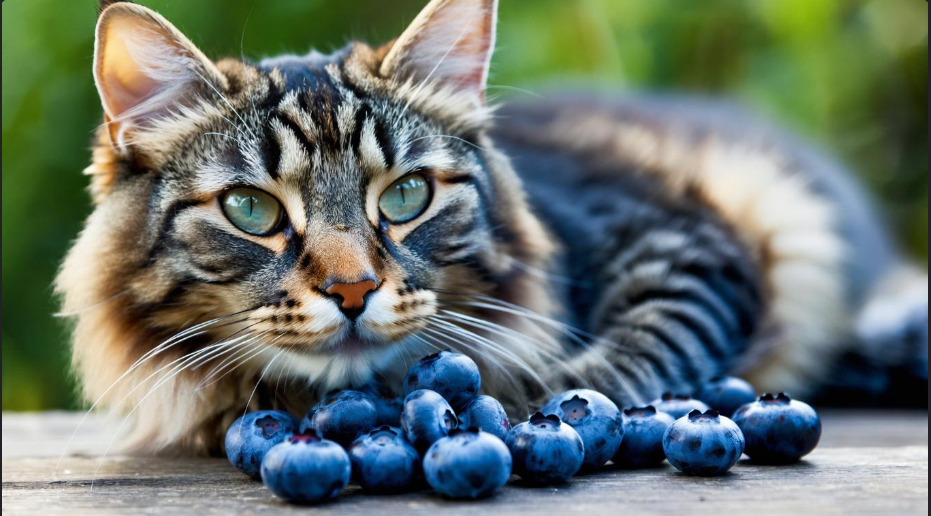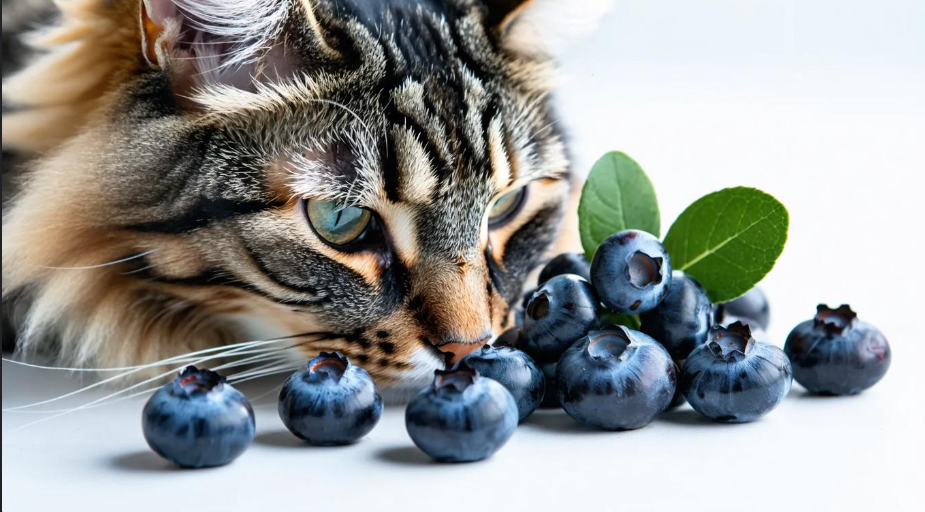Cats are curious creatures and often find themselves investigating what their human companions are eating. If you’ve ever wondered, “Can cats eat blueberries?” you’re not alone. In this article, we’ll explore whether blueberries are safe for cats, their potential health benefits, and how to serve them safely.
Table of Contents
Are Blueberries Safe for Cats?
Yes, blueberries are safe for cats to eat in moderation. Blueberries aren’t toxic to cats, which makes them a healthy snack option, provided they’re offered in small quantities. Unlike some fruits that pose risks (such as grapes or raisins), blueberries can be a fun, occasional treat for your feline friend.
Health Benefits of Blueberries for Cats

Blueberries are packed with nutrients, including vitamins, antioxidants, and fiber. One of the health benefits of blueberries for cats is their high content of vitamins C and K, which contribute to overall well-being. Additionally, the antioxidants found in blueberries may support your cat’s immune system and protect their cells from oxidative stress.
How Many Blueberries Can a Cat Eat?
While blueberries are safe, moderation is key. So, how many blueberries can a cat eat? It’s recommended to give only a couple of blueberries at a time as an occasional treat. Too many can lead to digestive issues, as cats are obligate carnivores and don’t require fruits in their diet.
Blueberries as a Treat for Cats
Serving blueberries as a treat for cats can be fun, especially if your cat is receptive to new tastes and textures. Cats typically prefer meat-based snacks, but some might enjoy the sweetness of blueberries. Always wash the berries thoroughly before offering them, and consider cutting them in half to make them easier to eat.
Can Blueberries Harm Cats?
While blueberries are generally safe, you might ask, can blueberries harm cats? In some cases, yes, if overfed. Too many blueberries can upset your cat’s stomach, leading to diarrhea or vomiting. If your cat shows any signs of discomfort after eating blueberries, discontinue feeding them and consult your veterinarian.
Nutritional Value of Blueberries for Pets
The nutritional value of blueberries for pets is impressive. Blueberries contain fiber, which can help with digestion, and their antioxidant properties may help reduce inflammation. Though blueberries shouldn’t replace any part of a cat’s normal meat-based diet, they can serve as a nutritious bonus.

Best Ways to Feed Blueberries to Cats
There are several best ways to feed blueberries to cats to ensure they’re enjoyed safely. You can serve them fresh, frozen, or even mashed into your cat’s food as a small topping. Be mindful of your cat’s preferences, as not all cats will like blueberries. Always introduce new treats gradually to monitor for adverse reactions.
Fruits Cats Can Safely Eat
Aside from blueberries, there are other fruits cats can safely eat in moderation. Some examples include apples (without seeds), bananas, and watermelon (without seeds or rind). It’s crucial to do research before offering any fruit to your cat, as some fruits can be harmful.
Antioxidants in Blueberries for Feline Health
The antioxidants in blueberries for feline health are one of the most significant benefits of this fruit. Antioxidants can help protect your cat’s cells from free radical damage, which may contribute to aging or disease prevention. While your cat’s diet should primarily consist of animal protein, blueberries can offer an antioxidant boost.
Blueberries and Cat Digestive Health
When it comes to blueberries and cat digestive health, small amounts of fiber from the fruit may help keep your cat’s digestion smooth. However, since cats aren’t accustomed to high levels of fiber, too many blueberries could cause digestive upset. Always ensure blueberries are an occasional treat, not a regular part of their diet.
Conclusion
In conclusion, cats can eat blueberries in moderation, and they can provide several health benefits. Blueberries are safe, packed with nutrients, and a fun way to offer your cat a different flavor experience. Just be sure to feed them sparingly to avoid any digestive issues. Always consult your vet before introducing new foods to your cat’s diet, and enjoy watching your feline companion explore a new healthy treat!






Leave a Reply